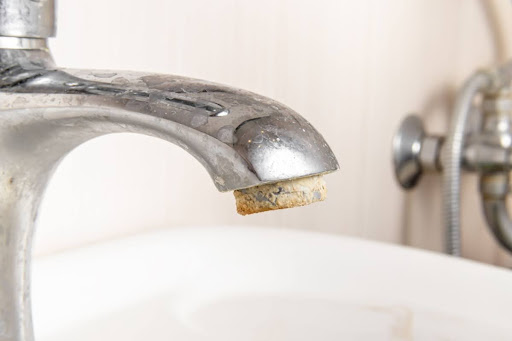If your soap won’t lather, your dishes look foggy, or your hair feels like straw after a shower, you might be dealing with hard water. It’s one of those problems that hides in plain sight. You live with it every day, but it slowly makes its presence known in annoying, frustrating ways. At Squeak’s Plumbing, Heating & Air, we’ve seen how hard water affects homes, health, and household routines.
That’s why we’re here sharing our expertise, so you can have the information and resources needed to take action for your home. Plus, we’re the ones to call to provide long-lasting solutions. From water softeners to water filtration, we work our magic so you can have peace of mind every time you turn on the tap.
What Is Hard Water?
Hard water comes from groundwater rich in dissolved minerals like calcium carbonate and magnesium. These minerals travel through rock and soil, picking up other elements like iron and metal ions along the way. The result? A mineral-heavy water supply that leaves behind residue, creates buildup, and affects taste. The longer it goes unchecked, the more frustrating and costly it becomes. That’s why keeping an eye out for these signs matters.
Signs of Hard Water in the Home
Hard water isn’t always obvious until you know what you’re looking for. These minerals, while invisible to the naked eye in your water glass, leave behind plenty of evidence once the water evaporates or reacts with other substances. You might be seeing these signs already without connecting them to your water supply. Understanding these indicators can help you pinpoint if hard water is the troublemaker you’ve been searching for.
Soap Scum and Film
One of the most classic villains of the hard water story is stubborn soap scum. You know that chalky, white residue that clings to your shower doors, bathtubs, and sinks? That’s the mineral content in your water reacting with your soap, creating an insoluble film that’s a pain to clean. Instead of a rich lather, you get a filmy mess that dulls surfaces and makes your bathroom feel perpetually grimy. This buildup isn’t just unsightly; it can also harbor mildew.
Spotty Dishes and Glassware
Do your glasses emerge from the dishwasher looking cloudy, or do your plates feel a bit gritty, even after a thorough wash cycle? Hard water is often the culprit behind these frustrating spots and films on your dishware. Those pesky mineral deposits, mostly calcium carbonate, get left behind as the water evaporates during the drying cycle, leaving your supposedly clean items looking less than sparkling.
You might find yourself rewashing dishes or resorting to vigorous hand-drying, all thanks to those dissolved solids in your water. It’s like your dishwasher is trying its best, but the water itself is working against it.
Dry Skin and Hair
Hard water can be a real downer for your personal care routine, leaving your skin feeling dry, itchy, and irritated after a wash. That’s because excess mineral content can strip your skin of its natural oils and make it difficult for soaps and shampoos to rinse away completely, leading to a residue that clogs pores. Similarly, your hair might feel dull, brittle, and look lifeless because these minerals create a buildup on the hair shaft, preventing moisture from penetrating.
Faded or Rough Laundry
If your vibrant clothes are coming out of the washing machine looking a bit lackluster or feeling stiff and scratchy, hard water could be to blame. The minerals in hard water can interfere with the effectiveness of your laundry detergent, meaning it doesn’t clean as well, and can also deposit themselves onto the fabric fibers. Over time, this mineral buildup causes colors to fade, whites to look dingy, and fabrics to lose their softness, shortening the lifespan of your favorite outfits.
Reduced Water Pressure
Morning routines become frustrating when shower streams weaken to disappointing trickles. Decreasing water pressure throughout your home often indicates mineral buildup inside pipes. You see, the calcium and magnesium deposits gradually narrow your pipes’ interior diameter, restricting water flow to fixtures and appliances.
Appliance Wear and Tear
Hard water doesn’t just affect the appearance of things; it can significantly shorten the lifespan of your water-using appliances. Your washing machine, dishwasher, coffee maker, and water heater are all susceptible to damage from mineral scale buildup. This accumulation can clog pipes, reduce heating element performance, and cause moving parts to wear out faster.
You might find yourself facing more frequent repairs or needing to replace expensive appliances sooner than expected, all due to those unseen minerals working away inside.
Unusual Taste or Smell in Water
While hard water rich in calcium and magnesium often doesn’t have a distinct taste or smell for many people, certain other minerals sometimes present in hard water supply lines can affect your drinking water. For instance, a high concentration of iron, another mineral that contributes to water hardness, can give your tap water a metallic taste or even a reddish, rusty appearance.
Some people might also describe the taste of very hard water as slightly chalky. If your water tastes or smells off, it’s definitely worth investigating.
Why Hire a Professional Plumber for Testing
It’s tempting to guess what’s going on based on signs alone, but proper water testing gives you a clear picture. A professional plumber tests for mineral content, pH balance, and contaminants that might be hiding in your water supply. With accurate results, you’ll avoid wasting money on the wrong water treatment system. The testing process takes minimal time yet provides valuable information that guides appropriate resolutions.
Solutions for Hard Water Issues
You’ve figured out that hard water is indeed crashing the party at your place. The good news is you don’t have to live with it because Squeak’s Plumbing, Heating & Air has your back with great solutions for hard water. We can help you implement systems that transform your water from problematic to practically perfect for your home’s needs.
The right approach for your family will depend on things like the specific hardness level, how much water you use, and your budget, and we’re here to walk you through those choices.
Water Softeners
Traditional water softening systems are a very common and effective method for combating hard water throughout your entire home. These systems typically use a process called ion exchange, which works like a mineral swap meet. Inside the softener tank, there’s a bed of resin beads coated with sodium (or sometimes potassium) ions.
As hard water flows through, the resin captures the calcium carbonate and magnesium ions, the culprits of hardness, and releases the sodium ion into the water. The result? Softer water from every tap. While these systems are pretty low maintenance, they do require periodic regeneration with salt to refresh the resin beads.
Salt-Free Conditioners
For those looking for alternatives to traditional salt-based softeners, salt-free water conditioners offer a different approach to tackling hard water problems. These systems don’t actually remove the hardness minerals like calcium carbonate and magnesium from the water.
Instead, they use various technologies, sometimes called template-assisted crystallization (TAC), to change the structure of these mineral particles. This alteration makes the minerals less likely to stick to surfaces and form scale inside pipes and on fixtures, providing some of the benefits of softer water without adding sodium to your water supply.
Point-of-Use Filters
If your main concern is the water quality for drinking water or at a specific tap, like your kitchen sink or shower, point-of-use filtration systems can be an excellent choice. These include options like under-sink water filtration units, faucet-mounted filters, or even showerhead filters.
Some advanced systems, such as reverse osmosis, can remove a wide spectrum of contaminants, including hardness minerals, chlorine, and more, offering targeted water purification. While they don’t treat all the water in your house, they provide high-quality filtered water right where you need it most for consumption or specific uses.
Having Problems With Hard Water? Call Squeak’s Plumbing, Heating & Air!
Dealing with the persistent annoyances of hard water can feel like an uphill battle, but you don’t have to face it alone. If you’re noticing spotty dishes, struggling with soap scum, experiencing dry skin and hair, or worried about your appliances, it might be time to address your water quality.
The team here at Squeak’s Plumbing, Heating & Air is ready to help you understand your water supply and find the best solutions for hard water tailored to your home’s needs, improving your daily health and comfort. Give us a call today for professional water testing and expert advice; let’s make your water work for you, not against you!




